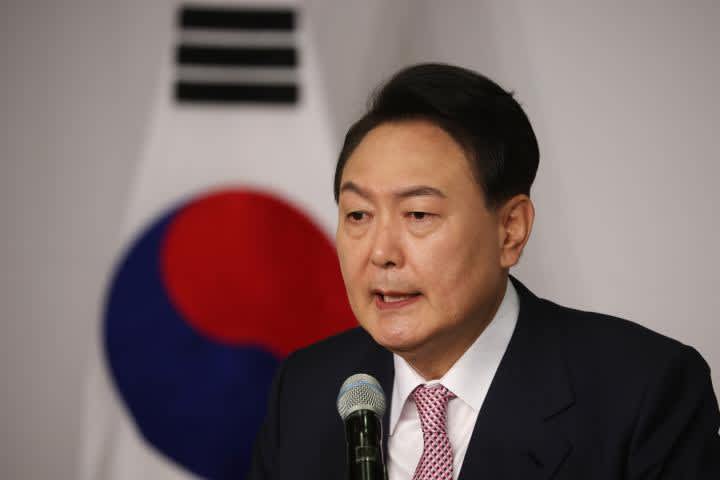In a historic event for South Korea, President Yoon Suk-yeol has been impeached after the country’s Parliament approved a motion for his removal. The decision was triggered by the controversial declaration of martial law on December 3, 2024, which was seen as a violation of the Constitution and an attempt to restrict the democratic rights of the population.
The South Korean National Assembly, composed of 300 legislators, approved the motion with 204 votes in favor, 85 against, and 3 abstentions, surpassing the required 200 votes to impeach the president. This decision leaves Yoon Suk-yeol in a precarious position as his presidency now hinges on the ruling of the Constitutional Court, which has up to 180 days to confirm or overturn his impeachment.
Why Was Martial Law Declared?
President Yoon justified the imposition of martial law as a measure to “protect constitutional order”, claiming the presence of “anti-state activities”. He also accused the opposition of controlling Parliament and having ties to North Korea. The martial law included extreme measures, such as:
- Banning all political activities.
- State control of the media.
- Banning strikes and labor stoppages.
However, the response from South Korean society was immediate and relentless. Thousands of citizens took to the streets in protest, demanding the immediate withdrawal of martial law. The pressure was so intense that Yoon decided to repeal the martial law decree just six hours after its declaration. This episode was the catalyst for the opposition to file the impeachment motion.
The Impeachment Process
The impeachment process against Yoon was initiated by the parliamentary opposition, which presented the motion for his removal shortly after the martial law was repealed. Although the People Power Party (PPP), which supports Yoon, officially opposed the impeachment, several of its members voted in favor, which was key to reaching the 204 votes required.
With the approval of the motion, Yoon has been immediately suspended from his duties. Prime Minister Han Duck-soo will serve as acting president, while the Constitutional Court deliberates on the case. This process could take up to 180 days, during which the court will evaluate whether the president violated the Constitution by declaring martial law.
National and International Reactions
The impeachment of Yoon has triggered national and international reactions. The United States and the European Union have expressed concern over the political stability in South Korea, a key country in the Asian region.
On the national front, thousands of citizens demonstrated in Seoul to celebrate Yoon’s impeachment. Many see the removal as a victory for democracy against an attempt to concentrate power. Images of the crowds celebrating in the streets of the South Korean capital have been shared around the world.
“This impeachment is a clear message: no one is above the Constitution,” said one of the demonstrators in Seoul.
What Happens Now?
With the immediate suspension of Yoon Suk-yeol, Prime Minister Han Duck-soo assumes the role of interim president. However, the future of the country now depends on the Constitutional Court, which must issue a final ruling.
The impeachment process will follow these steps:
1️⃣ Case Review: Judges of the Constitutional Court will analyze the evidence and arguments presented.
2️⃣ Public Hearings: President Yoon Suk-yeol will have the opportunity to present his defense and legal arguments.
3️⃣ Final Decision: The court has up to 180 days to issue its ruling. To confirm the impeachment, at least six out of the nine judges must vote in favor.
If the impeachment is confirmed, Yoon will be permanently removed from office, and South Korea will have to hold presidential elections to elect a new leader. This would be the second time in South Korea’s history that a president is removed through impeachment, the first being Park Geun-hye in 2017.
Economic and Political Impact
The announcement of Yoon’s impeachment has had immediate economic impacts. The South Korean Ministry of Finance has called emergency meetings to address possible impacts on financial markets and the country’s economic stability.
“We are closely monitoring the situation to mitigate any potential impact on the national economy,” stated the South Korean finance minister.
The political uncertainty caused by the impeachment has placed South Korea in a state of instability, especially at a time when the country is facing global economic challenges and geopolitical tensions with North Korea.
The impeachment of Yoon Suk-yeol represents a landmark moment in South Korea’s political history. The Parliament’s decision to approve the motion for his removal sends a strong message about the importance of the Constitution and respect for democratic rights.
Now, all eyes are on the Constitutional Court, which has the final say on Yoon’s fate. The international community is closely monitoring the situation, focusing on the political and economic stability of South Korea, one of Asia’s most important economies.
If the impeachment is confirmed, South Korea will have to hold presidential elections to elect a new leader. Having already experienced the impeachment of Park Geun-hye in 2017, the country once again faces the test of its democratic system.
